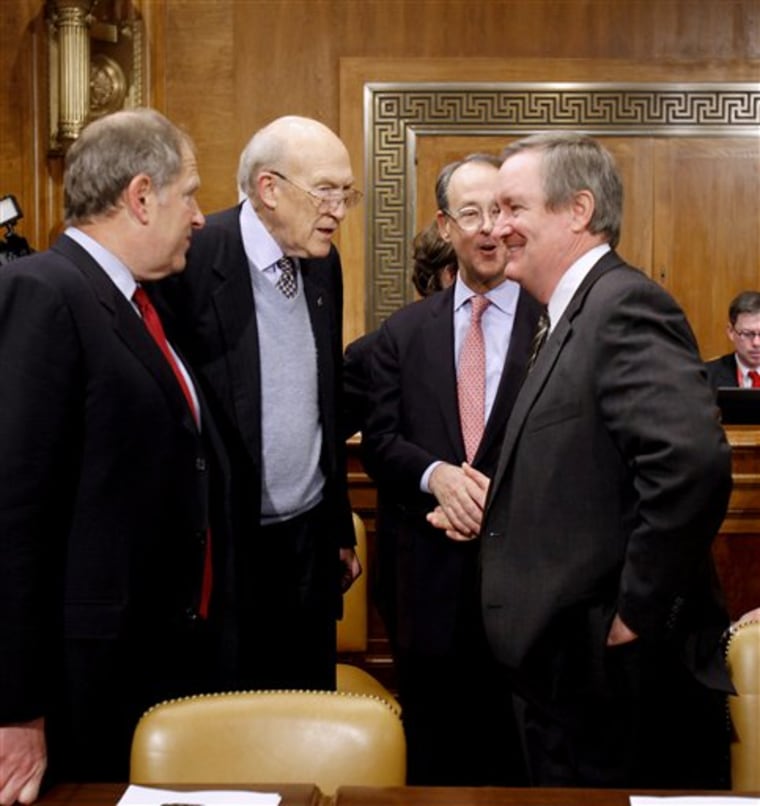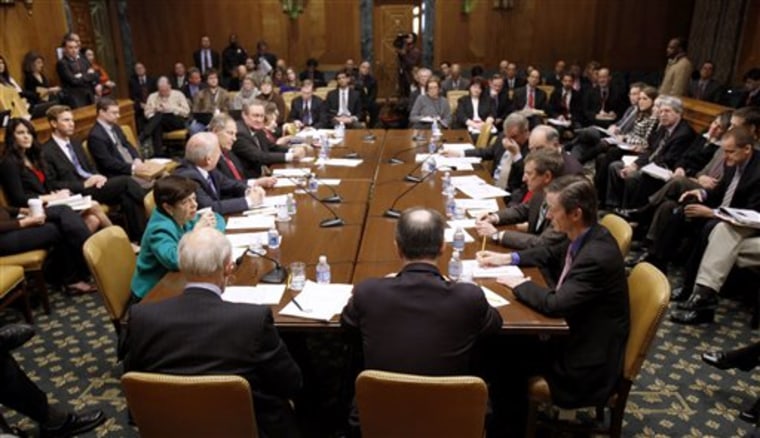President Barack Obama's deficit commission failed Friday to forge consensus on what to do about an increasingly urgent debt problem, but the breakdown of its vote lays out the road map for how Congress might address it next year.
The 11-7 vote in favor of the panel cochairmen's recommendations for a painful mix of spending cuts and tax increases foretells a bitterly partisan and possibly unproductive debate in the House. If there's a deal to be had, it will likely be reached in the Senate. Fourteen votes were needed to officially send the plan to Congress now for quick action on it.
About $4 trillion would be slashed from the budget over the coming decade — three-fourths of it through spending cuts and the other fourth from higher taxes. Deficits over the period are estimated in the $10 trillion range and are expected to require the federal government to borrow 33 cents of every dollar it spends.
Five of six senators on the panel — two Democratic allies of Obama and three conservative Republicans — voted for the plan's wrenching measures, including raising the Social Security retirement age, cutting future benefit increases and ending popular tax breaks like the mortgage interest deduction.
But only one of the half dozen House members on the commission endorsed the proposal — Democrat John Spratt Jr. of South Carolina. And he doesn't have to face voters in his district again; they decided last month to retire him next month.
GOP, Dems both criticize proposal
No other House members were willing to swing behind the painstakingly assembled proposal by Democrat Erskine Bowles, a White House chief of staff in Bill Clinton's presidency, and former Republican Sen. Alan Simpson of Wyoming. Republicans recoiled from tax increases and said it didn't do enough to rein in skyrocketing health care costs.

House Democrats Xavier Becerra of California and Jan Schakowsky of Illinois, meanwhile, pressed for bigger tax increases and less dramatic cuts to spending.
"The Bowles-Simpson plan further erodes the middle class and threatens low-income Americans," said Schakowsky.
The ink wasn't even dry on an earlier version of the proposal before House Speaker Nancy Pelosi, D-Calif., called it "simply unacceptable," a move that Republicans said undercut the panel's work.
The plan would nearly freeze the Pentagon's budget and outright cut spending by most domestic agencies. It would nearly double the federal tax on gasoline with a 15 cents per gallon increase. Income tax rates would fall, but only by eliminating or scaling back dozens of popular tax breaks, including the child tax credit, mortgage interest deduction and deduction claimed by employers who provide health insurance.
That recipe of shared political pain is the type of sacrifices that budget hawks say is needed in any bipartisan deficit-cutting effort.
"People have to be willing to embrace plans which actually lend themselves to compromise ... the kinds of plans that everybody's uncomfortable with but are the only things that get support," said Maya MacGuineas of the Committee for a Responsible Federal Budget, a group that advocates fiscal responsibility.
'We will all have to budge on long-held positions'
"That's where the Senate is. That's not where the House is," MacGuineas added. "I think that shows that the Senate is going to be the real place of leadership on this."
President Obama reacted cautiously. He praised the commission for its work and promising to closely study its proposals, but didn't endorse any of them.
"The undeniable fact is that no one party can successfully tackle this challenge alone," Obama said. "We cannot afford to fall back on old ideologies, and we will all have to budge on long-held positions."
Commission members who voted for the plan said they did just that. Assistant Democratic Leader Dick Durbin's vote was especially surprising. Durbin, of Illinois, resisted heavy pressure from Democratic constituencies like labor unions and trial lawyers in backing the plan. GOP conservatives Tom Coburn of Oklahoma and Mike Crapo of Idaho defied anti-tax powerhouse Grover Norquist, president of Americans for Tax reform, whose opinions carry enormous weight among Republicans.
Part of the reason the Senate's likely to take the lead on any bipartisan plan stems from the chamber's rules, which require a bipartisan 60-vote threshold for any meaningful legislation. In the House, the majority party usually rules at will.
Despite their opposition to the final product, anti-tax House Republicans on the commission didn't paint themselves into any corners.
"If I believed that the increased revenue would be used for deficit reduction, I might reluctantly come to the table in a global agreement," said Rep. Jeb Hensarling, R-Texas. "It just seems to me that somehow the spending restraint never quite materializes."
Commission members: on way to 'adult conversation'
Commission members said that by winning over 11 of the 18 panelists, they had defied expectations. They said it showed that Washington is capable of having an "adult conversation" on a bipartisan basis about the painful choices required to avert a European-style debt crisis. Panel members said the commission's work had fundamentally changed the national debate on the deficit
"We have changed the issue from whether there should even be a fiscal plan for this country to 'what is the best fiscal plan for this country,'" said former Service Employees Union International president Andy Stern, who opposed the plan but praised its goals. "And that is an enormous tectonic paradigm shift," he added.
Still, it was easier for commission members to vote for the recommendations knowing it wasn't a binding vote on real legislation.
"You have to remember that no one's shooting with real bullets," said Robert Reischauer, president of the Urban Institute.
